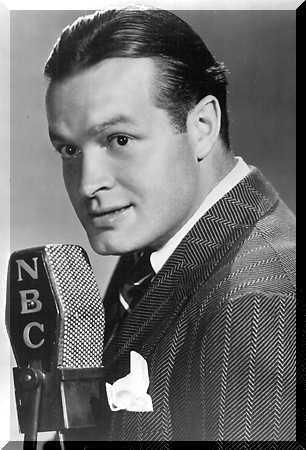 Yesterday marked the 110th anniversary of the birth of Bob Hope. He was as deeply rooted in the public consciousness as he was difficult to classify. He was a song and dance man from the old school – known as a comedian, actor, singer, dancer and author. But it is doubtful he would be remembered for any one of those talents independently. He was the first to admit that he was not a serious, or a particularly good, actor. He possessed impeccable comedic timing, but his comedy was corny and often harmless. His singing voice (much like his looks) was not all that impressive, but was somehow pleasant and disarming enough to work. More than anything Bob Hope was an entertainer, a personality. He came from the time and tradition of vaudeville where a performer had to be able to do a little bit of everything – act, sing, dance, tell jokes. There is something endearing about icons such as Bob Hope who managed to make the whole of their legacy so much more than the mere sum of its parts. We no longer have celebrities of this type. Nobody has their own theme song these days and we live in an era where it is impossible to find a single personality big enough to successfully host the Academy Awards, Hollywood’s most self-celebratory night. Bob Hope hosted the Oscars 14 times spanning five decades.
Yesterday marked the 110th anniversary of the birth of Bob Hope. He was as deeply rooted in the public consciousness as he was difficult to classify. He was a song and dance man from the old school – known as a comedian, actor, singer, dancer and author. But it is doubtful he would be remembered for any one of those talents independently. He was the first to admit that he was not a serious, or a particularly good, actor. He possessed impeccable comedic timing, but his comedy was corny and often harmless. His singing voice (much like his looks) was not all that impressive, but was somehow pleasant and disarming enough to work. More than anything Bob Hope was an entertainer, a personality. He came from the time and tradition of vaudeville where a performer had to be able to do a little bit of everything – act, sing, dance, tell jokes. There is something endearing about icons such as Bob Hope who managed to make the whole of their legacy so much more than the mere sum of its parts. We no longer have celebrities of this type. Nobody has their own theme song these days and we live in an era where it is impossible to find a single personality big enough to successfully host the Academy Awards, Hollywood’s most self-celebratory night. Bob Hope hosted the Oscars 14 times spanning five decades.
Perhaps this neutrality of personality is the reason he worked so well when paired with a partner. While Hope could certainly hold an audience on his own, be it a roomful of movie stars at the Academy Awards or several hundred troops on one of his many admirable USO tours, he was best when teamed up with other talent, such as Shirley Ross or Bing Crosby and Dorothy Lamour in one of the several “Road” movies they made together.
The seven “Road” films that Hope and Crosby made between 1940 and 1962 are almost parodies of themselves, foregoing any artistic pretense in exchange for unapologetic harmless fun. They are as charming as they are ridiculous.
Family Guy creator Seth MacFarlane has almost single-handedly resurrected this antiquated brand of entertainment with a series of Family Guy “Road” episodes featuring iniquitous infant Stewie and faux-intellectual dog Brian in the Bing and Bob roles.
Hope and Bing Crosby each recorded versions of the now classic Christmas song “Silver Bells” in 1950. Crosby released his version with Carol Richards just in time for the Christmas season and Hope introduced the song in film with Marilyn Maxwell in The Lemon Drop Kid, released the following year. The songwriting team of Jay Livingston and Ray Evans had a knack for crafting poignant and evocative songs with a sort of built-in sweeping nostalgia set in place from inception, be it “Que Sera, Sera,” “Mona Lisa,” or the theme song to the 1950’s television show Mr. Ed. Few popular Christmas songs capture the beauty and magic of the commercialized aspects of the holiday, not to mention the anticipation of its arrival, as effectively as Silver Bells.
The 1938 film The Big Broadcast of 1938 contains an Academy Award winning song that would become Hope’s lifelong theme song. The duet with Shirley Ross is one of cinema’s magic moments. Hope and Ross play a couple on the rocks – both in their relationship and at the bar. As they sit half sauced slouched over an ocean liner bar, sipping a few civil rounds of libations to help grease the wheels of their impending divorce, they begin to reminisce about their life together. The conversational cadence of Ralph Rainger’s melody paired with Leo Robin’s detail-rich lyric is the perfect vehicle for Hope’s easy, self-deprecating charm to communicate this very private moment. As the couple recalls intimate weekends in Niagara Falls and mundane moments that carry that special weight shared between lovers they begin to feel a rekindling of their relationship and ultimately decide to give it another go. Hope and Ross are funny, tender and, most of all, utterly believable.
Hope would sing this song for the rest of his life, changing the lyric to adapt to the appropriateness of the situation. But nothing can beat the performance at the bar at the end of the film for its gentle, bruising humanity.
